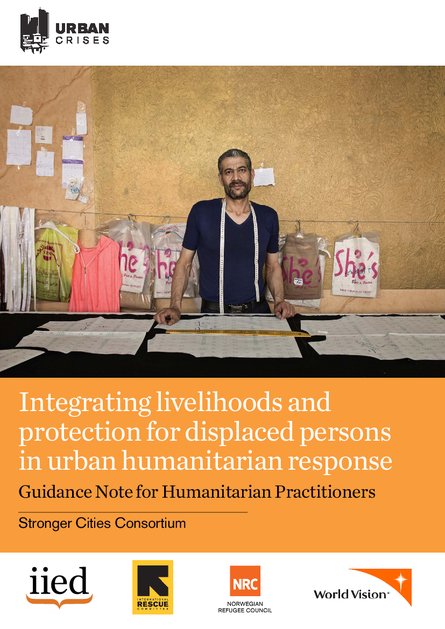
Rural to urban migration accompanied by population growth in rapidly developing lower- and middle-income countries has contributed to a high rate of global urbanisation. Urban areas are now home to over half the global population (UNDESA (2014 Revision) as well as two thirds of the world’s refugees and internally displaced people (IDPs) (UNHCR/OHCR/IOM, 2015). For displaced persons fleeing conflict or naturally triggered disasters, cities provide unparalleled economic opportunities, but they are also characterised by social and financial disparities. In urban spaces, the high cost of living necessitates access to income generating opportunities, yet refugees face unique challenges securing safe and sustainable livelihoods. A lack of social capital, including social networks and information on labour markets, language barriers and risks associated with public transport, can make economic integration difficult for new arrivals. In some cases, legal restrictions limit refugees’ ability to participate in the formal labour market, with policies often derived from host country perceptions that refugees are part of a broader migratory population that are in competition with local residents for a finite number of jobs. Fears that supporting sustainable employment for refugees might promote long-term stay, thereby overburdening infrastructure and resources and permanently changing national demographics, can also influence policy.
This note was derived from a desk review and case studies of humanitarian and development initiatives for Syrian refugees in Lebanon and Jordan, where over 2 million refugees have fled (1.5 million to Lebanon (LCRP, 2017) and 655,000 to Jordan (UNDP/UNHCR, 2016)), now comprising significant percentages of host country populations. The majority of Syrian refugees resides in urban or peri-urban environments and struggles to meet their material needs, with nine in ten living below the host country poverty line (World Bank/UNHCR, 2016). The enabling environment for refugee self-sufficiency varies between the two case studies. In Lebanon, the mandate to obtain and renew residency permits at annual costs was prohibitive and administratively complex, forcing many refugees into irregular status and inhibiting their ability to apply for a work permit and gain employment in the formal sector (Human Rights Watch, 2017). While this policy has recently been amended to waive permit fees for some Syrian refugees holding UNHCR documentation, severe macro-economic shocks and high domestic unemployment have deterred the Lebanese government from supporting the inclusion of Syrian refugees within the labour market. By contrast, Jordan has received external investment from the World Bank Group, which placed conditions upon the Compact Agreement that displaced Syrians’ contribution to Jordan’s economic growth. While this has put the emphasis on increasing the number of Syrians who receive work permits for employment in the formal labour market (World Bank, 2016), many refugees continue to pursue informal work.
Resource collections
- UN Habitat - Urban Response Collection
- Urban Response - Urban Crisis Preparedness and Risk Reduction
- Urban Response Collection - Community Engagement and Social Cohesion
- Urban Response Collection - Economic Recovery
- Urban Response Collection - Environment and Climate Change
- Urban Response Collection - Housing, Land and Property
- Urban Response Collection - Urban Crisis Response, Recovery and Reconstruction
- Urban Response Collection - Urban Resilience